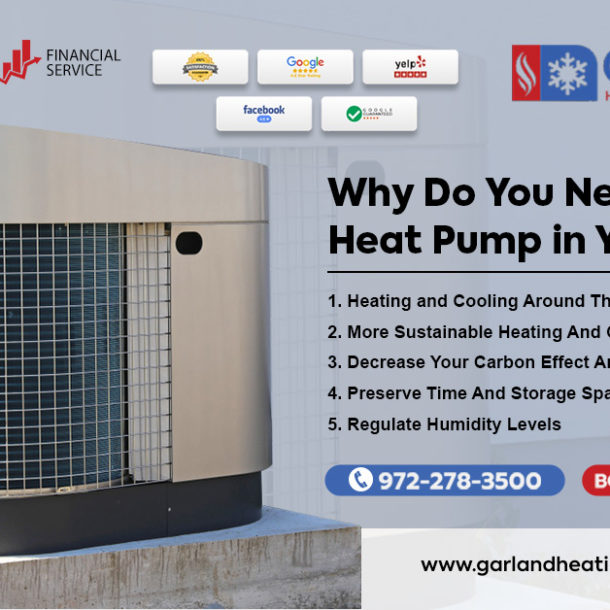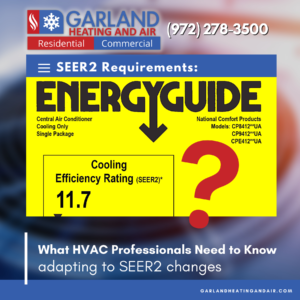
Coronavirus Update: We care about your health and continue to service our customers safely. Read More
2023 started off with many changes to the HVAC industry, as new Department of Energy SEER2 (Seasonal Energy Efficiency Ratio 2) efficiency standards are now officially in place. The last time you purchased an HVAC system, you probably considered the unit’s SEER before choosing.
The SEER is a standard for measuring an HVAC system’s efficiency. That’s an acronym for “seasonal energy efficiency ratio,” higher SEER numbers indicating a more efficient HVAC system.
Beginning on January 1, 2023, SEER won’t be the standard anymore. Instead, every new HVAC system will receive a SEER2 rating, and a higher SEER2 will be more efficient than a lower SEER2. But, SEER2 is calculated much differently from SEER, an all-new standard.

What is SEER2 anyways?
The point of SEER2 is to make up for deficiencies in SEER calculation.
The US Department of Energy or DOE sets the standards for appliance efficiency and issues clear guidelines on how manufacturers need to calculate the relative efficiency of their equipment. Criteria for SEER were established many years ago, and manufacturers have been adhering to them since. There were always issues with SEER. In a recent report in ACHR, the Department of Energy created SEER2 better to align HVAC efficiency ratings with real-world operating conditions.
In short, the way SEER considers static pressure as part of its overall calculation could be more realistic. SEER2 still accounts for static pressure, which is more in line with how systems are set up in your home.
How will SEER2 affect me?
The effect of SEER2 is to make HVAC systems more efficient. The DOE increased the minimum SEER over the years, they’ve moved the goal only this time. SEER2 will affect consumers:
You might be tempted to replace their old, failed HVAC system with a less expensive 14 SEER system while they still have that option. To be clear, it will cost less than getting a 14.3 SEER2 system in 2023.
However, that 14 SEER HVAC system could put you in trouble if you want to sell your house soon. When the DOE increased the minimum SEER from 10 to 13 in 2006, many buyers will have remorse among people who had just installed SEER 10 units. During the process of listing their homes, real estate agents were informing potential buyers that the air conditioners, while new, needed to be compliant with the current energy efficiency standards. Buyers would demand that sellers replace the HVAC system with a higher SEER.
You could end up in the same situation. To keep this from happening, the consumer’s best option will be to install a 15 SEER or 16 SEER system before SEER2 is in effect. The minimum SEER2 of 14.3 is equal to SEER 15 under the current standard, getting a slightly more efficient system today will keep you safe after January 1, 2023. Just remember SEER and SEER2 aren’t the final words on HVAC efficiency.
While SEER and SEER2 are factors you should consider when shopping for an air conditioner, other characteristics significantly impact efficiency.
We’re talking about the HVAC speeds, sometimes referred to as stages. Most air conditioners are standard, single-speed units. They turn on to cool your house, run at full speed the whole time they’re going, and then shut off when the thermostat is satisfied. Many home systems currently run this way.
Two-speed systems are more efficient, and they run at a low speed and only change over to the full-blast setting on scorching hot days or if you lower the thermostat’s temperature by several degrees. It will run at a lower speed and cool less air, the two-speed system keeps comfortable temps in your home while demanding less power than a standard, single-speed unit.
Then there are variable-speed air conditioners. SEER and SEER2 aside, variable speed units offer the best efficiency for most people.
Variable speed units speed up and down to meet the exact cooling needs of your home at any given time. They’ll run at lower speeds throughout the day and might even keep running for almost an entire day without turning off!
Standard HVAC systems’ biggest power draw happens when they start running for a cycle. Variable speed units don’t start up very often, so they use much less power. Then, while they are running, it’s normally at a low speed. AKA less cooling, therefore less energy used.
Since two-speed and variable-speed units run for longer cycles, they also extract more humidity from homes than standard HVAC systems. We run it more often with a traditional design to deal with the humidity between cycles. As a result, the system starts up more often and runs at high speed for extended periods. Both of these things happen with a two-speed or variable-speed system.
All this is to help you understand that there’s more to HVAC efficiency than just SEER or SEER2. You’ve got to consider the speed or speeds of the system you’re purchasing.